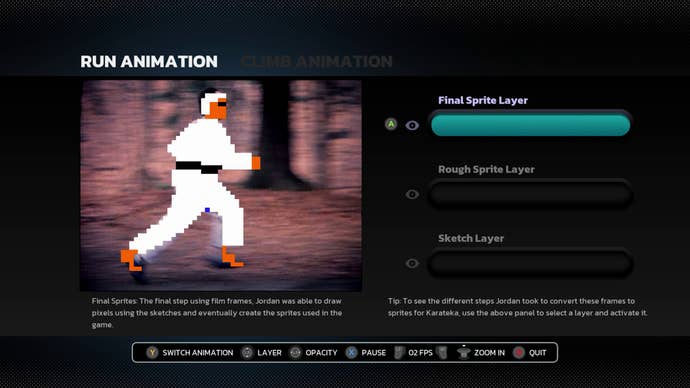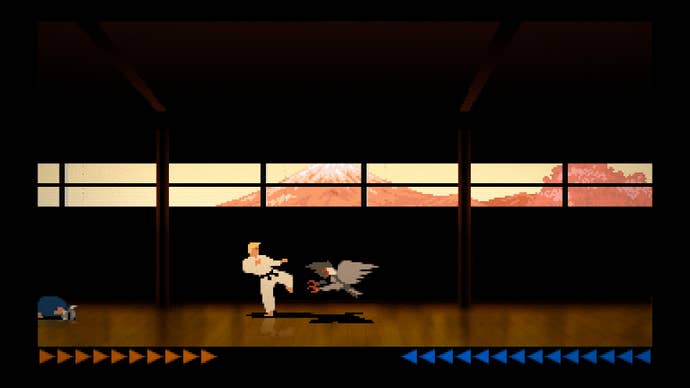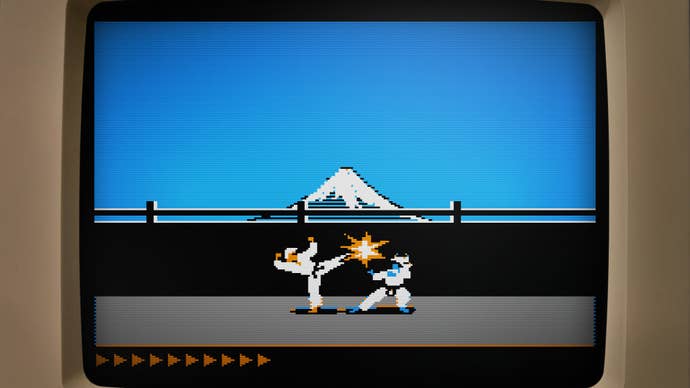“If you ask Neil Druckmann what inspired him… you’re going to get back to Karateka.”
(Mike Mika arrived a little late so he pops up towards the end of the interview.)
And I wondered, is that a common reaction to these things you’re making?

How can we get more of the history in there?
Retro collections give you the “what?”
- here’s the game - but we want to do the “when?”

and the “who?”
and the “how?”.
And, importantly, the “why?”.

So it’s good to have it commercially available but you’re not growing the audience.
You’re not making new fans of it and you’re not understanding where that game came in history.
With Karateka, it’s like this game very specifically inspired a generation of designers that came after it.

Karateka did, not games like it -thatgame.
And when you play The Last of Us, you could trace the line back.
If you just play it, you’re like, ‘Oh, this is a video game.’

And also so we can understand the full story of who made it.
Because we think about Jordan Mechner but we really need to be thinking about Francis Mechner, his father.
We need to be thinking about Gene Portwood and Lauren Elliott at Broderbund.
you should probably think about all the people that have this impact on it.
It’s not supposed to be school.
So we have to ask the question of how do we keep the player engaged learning all this?
So it’s like, how do you break that up?
How do you gamify it?
A lot of it, we’re going off vibes, because nobody’s really done this before.
So one thing you said is often with these classics, youthinkyou know the story of them.
It’s incredibly moving the way they speak to each other.
The respect that flows both ways I think is just so beautiful.
Are you ever, when you put these things together, like, “Oh!”
Do you make discoveries along the way?
Chris Kohler:Yes absolutely.
Because the Atari Jaguar, what a lot of people know about it is as a punchline.
It’s like, “Oh, this is a bad video game system.”
And really it wasn’t a bad video game system.
I also spent twenty-five years as a journalist.
What is the story that’s being told here?
And you have to have that editorial eye for it.
What are the stakes?
There’s got to be that through line.
I was like, “Oh my god, this is huge!”
There’s stuff in every direction.
Everything can be in, and everything can be in because you, the player, have that control.
you’ve got the option to’t show all that in a film.
You could do all that in a book, but it would be a very thick book.
Then it’s like, well do you want to dig any further?
And ultimately it’s up to you as to whether or not you want to do that.
We have a fifteen-minute audio podcast in there.
We can just do that.
We just do exactly what we feel is okay.
So I’m leaving my questions behind now and just following instinct, so apologies!
And then also the pocket watch - I think the pocket watch without a face in it.
It’s a bit too much."
Do you get to these points?
There are a lot of basic details and things like that that are left to the journals.
What was the process of getting to that like?
Were there a lot of missteps or did it come together quite naturally?
Chris Kohler:Well the nature of the material that we had for Karateka itself was very helpful.
So we started working on this timeline concept where everything was chronological, essentially.
We had done a rough version of that.
And as we’re doing that, some things start to emerge.
So as we’re doing that work, some deficiencies start to appear.
This, then, took everybody; Karateka had to be put on the shelf.
Should we have galleries?
Yeah, yeah - we can do galleries.
But yeah, we definitely realised this was an organisational and design problem.
[Mike Mika joins the call at this point.]
So we’ll do that incrementally.
But I don’t think there’s going to be any sort of mass reshuffling any time soon.
It was a very rich experience for me.
I mean, obviouslyCriterion and its lovely editionscome to mind.
That’s what it feels like to me.
That game has got to have a fascinating story.
But then people would be like, “Oh, I want to buy this,” you know?
We don’t just want to tell the stories of the winners - that’s not history.
So what are the stories that we could potentially tell?
They were ahead of the curve on all this stuff.
As it’s coming together, we’re getting excited.
We wouldn’t be here if we didn’t see all that before.
Because Ka-rah-teka - how was that?
I cannot pronounce that word!
[Chris and Mike laugh.]
Chris Kohler:That’s one way to do it!
Chris Kohler:Well it’s always just like you don’t know.
With Atari 50, that absolutely was the risk.
That was the first interactive documentary that we put out.
I don’t want to read!
Where are my video games?
I can’t find my video games."
That could have been an issue.
Let’s see if people will go through it and not even get to the game for hours.
And then that worked also, so it’s really weird - this keeps working.
It doesn’t matter how you deliver it.
If the story is really tight, it’s really compelling, I get absorbed by it.
If we’re doing our job right, that story is going to be all encompassing.
That part of it is one reason why I think that works.
Does that make it easier?
Or morenaturalI guess is what I’m asking.
To put something together which defies categories?
I don’t know what it felt like.
It felt like the weirdest, most magical book I’d ever found or something like that.
But people understand that.
Mike Mika:I was a film student through college and I always wanted to make movies and documentaries.
There’s been a few documentaries I’ve helped produce.
It’s been a passion of mine over the years.
But the one common thing we all have is a love for video games and video game history.
The timeline feels so nice.
It feels like you’re floating along in a Mercedes.
It’s got that lovely cloud feel - there’s no friction there.
Chris Kohler:We cannot have that.
For this, it was like we just have to get past that.
It’s fun if you might make that happen.
It’s a technical lift.
But here, it has to be so immediate.
And it goes without saying the tech team has been pulling off some miracles.
I want to ask another impossible question again.
And are there challenges which you feel haven’t been solved yet?
Are there great games but just the documentation is lost?
But again, we’re trying to get that audience built up.
I’m going to go back, I’m going to buy the previous ones also."
Ultimately that’s it.
Are we there yet?
Can we get there years into the future if we really build this up?
I’d never even thought about that.
Anyway, thank you.
It was the same both times.
And that was really what they said.
Chris Kohler:You know what the challenge is?
The challenge is right now we have that advantage of novelty.
So that’s the ongoing challenge.
That sounds like a brilliant problem to have though right?
Well look, thank you both so much and have a lovely rest of your day.
Mike Mika:I would do a Vid Kidz documentary in a heartbeat.